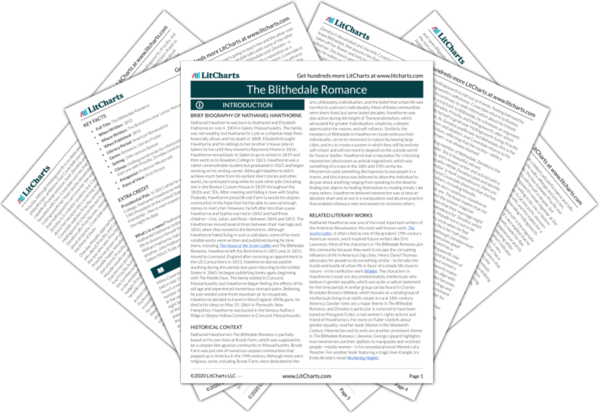When a group of Boston intellectuals co-found Blithedale, a utopian society on a farm a few miles outside of the city, they believe that returning to nature, working the land, and abandoning the corruption and social artifice of the city will improve their lives. At first, it seems to work; the reformers learn to grow crops, they are friendly and cooperative with one another, and they seem happy. However, as time goes on, they realize that nature—both the natural world and human nature—do not appeal to them as much as they hoped. Living in nature and working the land does not inspire Coverdale’s poetry and it doesn’t make the community more moral or honest; as it was in the city, Blithedale is rife with secrets, disagreements, and the lingering social norms and hierarchies that they tried to discard. Furthermore, Coverdale learns that he perhaps prefers the artificial conventions of city life to the reality of liberated human nature, particularly as it applies to female sexuality. This is to say that, despite his idealism, Coverdale winds up preferring the obedient and rule-bound Priscilla to the more natural and sexually-liberated Zenobia—a preference for convention and artifice that he cements by abandoning Blithedale altogether and returning to his life in the city. By showing Coverdale’s disillusionment with human nature and the natural world, Hawthorne suggests that artifice is alluring and that nature itself isn’t inherently pure.
From the very beginning, Coverdale identifies Zenobia with nature. Namely, he is fascinated by the fact that she exudes a natural sexual energy—one that women more beholden to social norms try to hide. During their first meeting, Coverdale observes that “One felt an influence breathing out of [Zenobia], such as we might suppose to come from Eve, when she was just made.” This means that Zenobia seems completely natural and untainted by artifice, convention, or refinement. Therefore, this passage implies that Zenobia’s exuberant sexuality is natural to women (and that women who are chaste and demure are repressed by artificial social norms). Further associating Zenobia’s sexuality with nature, Coverdale thinks that “There is no folded petal, no latent dew-drop, in this perfectly developed rose!” This passage—a reference to Zenobia—implies that she is not a virgin (a “folded petal” or “dew drop” would be her virginity). If a “perfectly developed rose” has no virginity, then Coverdale is suggesting that sexual knowledge is the natural state of a grown woman. However, he does not mean this to be entirely admiring; he’s drawn to Zenobia’s sexuality and also repulsed by it, as he seems to find it improper. This shows that Coverdale himself—even though he came to Blithedale to escape artifice and oppressive social convention—is uncomfortable leaving all of that behind.
If Zenobia represents pure nature, Priscilla represents pure artificiality. She does not grow naturally into her own person and she does not express her own preferences and desires—instead, she is quiet and shy, and her actions and personality are shaped by the world around her. In contrast to Zenobia, Priscilla is described as virginal and repressed, drawing attention to her distance from the natural sexuality that Zenobia embodies. Hawthorne implies that there is something eerie about this. When Coverdale first sees Priscilla, he describes her as “unsubstantial” and later, even though she’s gained a bit more color in her cheeks, he says she’s “shadowlike.” These descriptions suggest that Priscilla isn’t quite a full person—she doesn’t have vibrancy or individuality, which also means that it would be particularly easy for a man to exert his influence to shape her into whatever kind of woman he wants her to be. This happens repeatedly throughout the story; Westervelt saps Priscilla of free will and turns her into the Veiled Lady, for instance, and then Hollingsworth controls her throughout their marriage. In general, then, Priscilla adheres to social norms and allows the men around her to determine her fate rather than making her own decisions or even expressing her preferences. Instead of being her natural self, Priscilla is “the type of womanhood, such as man has spent centuries in making it”—that is to say, Priscilla has no nature of her own, just artificial qualities that men have deemed desirable for a woman to have.
When Hollingsworth and Coverdale both fall in love with Priscilla instead of Zenobia, it shows that—despite their rhetoric of embracing nature—they are both ultimately more comfortable with artifice. For both men, this revolves around their inability to accept female sexuality. Early on, Coverdale says that he wouldn’t fall in love with Zenobia “under any circumstances” and part of the reason for this seems to be that he feels “defrauded” by the sexual history he suspects she has. “Defrauded” is a loaded word here, because it suggests that women should naturally be virginial, and to have any experience with sex makes them fraudulent or unnatural. By associating sexually liberated Zenobia with nature, however, the story suggests that the opposite is true; nonetheless, Coverdale seems unable to accept or embrace that Zenobia’s sexuality is natural. Likewise, Hollingsworth describes human sexuality (as presented in the works of Fourier) as “the portion of ourselves which we shudder at.” Once he discovers Zenobia’s “whole character and history,” including her sexual past, he rejects her and “rest[s] on […] Priscilla,” meaning he turns from Zenobia’s sexuality and embraces Priscilla instead, who seems to have adhered to the artificial sexual norms that Hollingsworth values. In this way, both Hollingsworth and Coverdale reject what’s natural (Zenobia) and embrace the artificial (Priscilla)—a choice they cement by abandoning their rural experiment altogether and returning to city life.
Nature, Artifice, and Sexuality ThemeTracker








